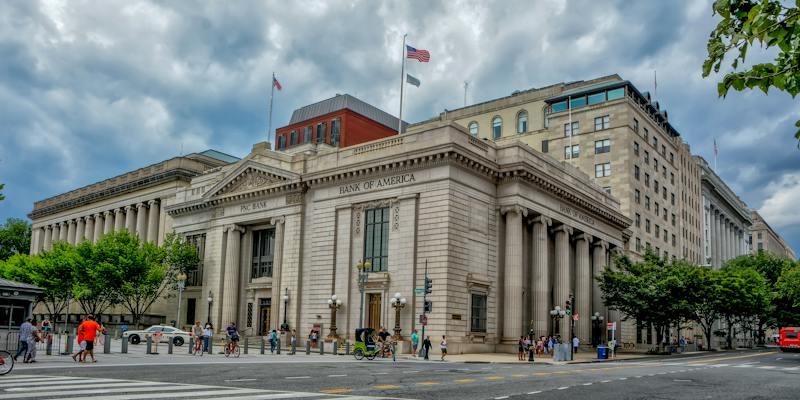The Trend of Banks Scrapping Overdraft Fees: Reasons and Impacts
Feb 02, 2024 By Triston Martin
A significant annoyance for many bank customers, these fees average around $35 per incident. Several prominent financial institutions have undertaken recent initiatives to decrease or eradicate these charges, such as that Capital One, Bank of America, Truist, U.S. Bank, and Wells Fargo. All negative bank account fees, including those associated with overdrafts, were eliminated by Discover in 2019.
Reason For Reduction Or Removal Of Draftng Fees
As customer discontent increases, financial institutions modify their bank overdraft charges strategies. Consumer Financial Protection Bureau chairperson and chief executive officer of SaverLife, Leigh Phillips, emphasizes that clients have an unprecedented array of banking alternatives. Innovative neobanks and challenger banks present customized services that appeal to a wide range of customers, displacing traditional banks and credit unions as the primary participants.
To attract and retain customers, traditional financial institutions are compelled to reassess their approaches due to the intensified competition exacerbated by the emergence of online and mobile-first banking solutions. Reassessment is underway regarding overdrafts, which are notorious for causing financial strain and anxiety. The ability of banks to aid customers in evading these exorbitant charges can increase the appeal of their services.
Fintech pioneers, including Chime and SoFi, are challenging conventional practices by introducing innovative functionalities that serve as a protective measure for clientele. By granting users access to a maximum of $200, the SpotMe® feature of Chime effectively mitigates the risk of overdrafts. Similarly, SoFi provides a $50 cushion. Financial institutions are undergoing a substantial transformation in how they cater to customer requirements and oversee the banking experience by introducing these complimentary services, which are accessed in conjunction with qualifying account activities.
Current Situation Of Drafting Fees
When an account balance falls below a certain threshold, overdraft fees frequently exceed a single charge. When a customer continues to conduct transactions without sufficient funds in their account, banks frequently assess multiple fees in a single day. This can result in accruing charges that can be significant over time. Overdraft protection transfers, the maintenance of a negative balance, or the application for a line of credit to cover overdrafts may incur additional fees. As a result, notable financial burdens may be imposed on individuals in the form of bank overdraft-related expenses.
According to Phillips, certain people are prone to recurring negative bank account overdrawals, typically the result of an oversight or unanticipated income shortfall. Significant amounts of the wages received by these individuals may be spent reimbursing overdraft fees. Particularly for those in lower income brackets or with irregular incomes (e.g., gig workers or hourly employees), this cycle eventually becomes untenable.
The imposition of overdraft fees can worsen these individuals' financial challenges. As many needed to adapt to new work environments and methods of securing profits. Therefore, the decision through banks to get rid of or lessen bank overdraft charges is a tremendous step toward aiding customers in improving their economic health.
Examples Of Banks That Removed Draftng Fees
Alliant Credit Union
Alliant Credit Union made a significant move in 2021 by stopping the collection of overdraft and insufficient funds (NSF) fees. This initiative aimed to aid members who maintain their accounts in good standing. Particularly, through the Courtesy Pay program, Alliant is supportive by covering checks or ACH transactions that lack sufficient funds. This program also extends to debit card transactions through the Extended Courtesy Pay service. Although these programs offer a safety net, it's crucial to note that the full amount of any overdraft is due immediately, emphasizing the importance of responsible financial management.
Ally Bank
Ally financial institutions abolished overdrawn expenses in 2020. It made this decision permanent, signaling a protracted time-period commitment to customer monetary well-being. This bank’s approach is straightforward, and transactions that could bring overdrafts are declined without cost. Additionally, the bank introduced the CoverDraft service, offering a buffer of up to $250 for eligible customers. This feature provides peace of mind, as any overspending is automatically balanced against the next deposit, minimizing the potential stress of negative bank account management.
Bank of America
Bank America took decisive steps in 2022 by halting NSF expenses and substantially reducing overdraft costs from $35 to $10. This policy limits the number of overdraft costs to almost 2 per day and eliminates the $12 overdrawn safety transfer price through its balance connect program. Regardless of these modifications, the financial institution mentioned a good $392 million in revenue from overdraft and NSF expenses in 2022. however, Bank Of America faced scrutiny from the CFPB for questionable practices, resulting in a hefty $250 million in fines and reimbursement bills, underscoring the importance of obvious and honest banking practices.
BMO Harris
By eliminating insufficient funds and overdraft transfer fees in 2022, BMO Harris demonstrated its commitment to financial justice. The bank cut overdraft fees significantly. They cost $15 per incident for consumer and small business accounts. A daily limit of three overdraft fees applies.
Capital One
In early 2022, Capital One discontinued the imposition of bank overdraft fees, acknowledging the detrimental financial impact they produced, thereby forfeiting an approximate annual revenue of $150 million. Furthermore, the resolution to eliminate non-performing loan (NSF) fees in 2021 further underscores this audacious action. Customer flexibility and control over financial transactions are further enhanced by Capital One's alternative account management options, including declining transactions that may result in overdrafts or transferring funds from linked accounts.
Citizens Bank
Customers who returned their accounts to a positive balance by the close of business the following day were eligible to avoid overdrawn fee grace periods instituted by Citizens Bank in 2021. The bank continues to impose a daily fee cap of $5 and a surcharge of $35 per item paid. However, it provides alternative options, such as the EverValue Checking account, which rejects transactions that can potentially overdraw the account. This account accommodates customers who prefer simple and feasible financial solutions.
Fifth Third Bank
The elimination of NSF fees for all consumer accounts by Fifth Third Bank in June 2022 was a customer-centric action. The bank has imposed a daily cap of three overdraft fees, with each costing $37. It is worth mentioning that to present a fair fee structure and to accommodate the practical financial circumstances of its clientele, these charges are waived for transactions amounting to $5 or less or for account overdraws of $5 or less by the close of business.








